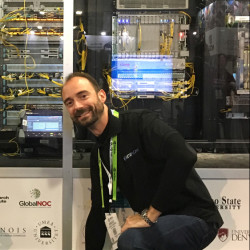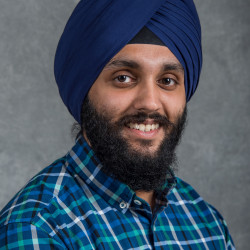New Employee Profiles - May 2017
May 1, 2017
Gonzalo P. Rodrigo Álvarez, CRD

Gonzalo P. Rodrigo Álvarez
This month, Gonzalo P. Rodrigo Álvarez joins CRD’s Science and Technology Department as a postdoctoral fellow. Initially, he will be working with domain scientists and NERSC staff on the Science Search project to create new methods for sifting through massive scientific datasets. The collaboration works with domain scientists to figure out their search needs, then applies machine learning tools to classify and identify datasets using their environment information as a source of metadata (e.g., the code of the application that generated the dataset).
Rodrigo may be a new employee, but he is no stranger to Berkeley Lab. In fact, he spent the last three years working on and off in CRD’s Data Science and Technology Department. For six months in 2016, he worked at the Lab investigating supercomputing scheduling models, including workload analysis and performing scheduler simulations. For six months in 2015, he was an intern working on workflow task managers and workflow scheduling. And for five months in 2014, he was a visiting scholar that helped analyzing the workloads of the three NERSC systems of the time: Edison, Hooper, and Carver. He also spent some time as a Google intern working with large-scale data processing workflows and steaming pipelines; as well as four years as an R&D engineer at a network equipment manufacturer, where he learned about network protocols, transport technologies, embedded systems, and industrial software development.
“When I was six years old, I learned to draw paper boats using ‘prints,’ ‘asterisks,’ ‘space’ and a BASIC interpreter in a green screen Amstrad PCW 8512 personal computer that my parents bought for work,” says Rodrigo. “Those days were the beginning years of my amateur, professional, and scientific relationship with computing.”
Originally from Zaragoza, Spain, Rodrigo didn’t stray far for college. He earned both his Bachelors and Masters degrees in computer engineering from the Universidad de Zaragoza, located in his hometown. He would later move to Sweden to purse a PhD in computer science from Umeå University. Lavanya Ramakrishnan, who leads CRD’s Usable Software Systems Group, served as co-supervisor of his thesis, along with Umeå University Professor Erik Elmroth.
In his spare time, Rodrigo likes to camp, hike, ski, travel and play music. As a new resident of the Bay Area, Alvarez also plans to attend a lot of concerts.
Sartaj Baveja, ESnet

Sartaj Baveja
As ESnet’s newest Junior Software Engineer, Sartaj Baveja will be developing software to support the network’s operations. He is currently working on a Google Cloud Dataflow pipeline that will process large quantities of time-series data and provide network statistical analysis. Baveja is also working on MyESnet, an interactive network portal monitor network performance in real time.
Although Baveja officially joined ESnet as staff this month, he is no stranger to the organization. As an ESnet Software Engineering Intern in 2015, he implemented a time-series analytics engine that generated 60 percent performance improvement by parallelizing and batching database writes. And last summer while interning at CERN, Baveja helped evaluate the capabilities of Oracle’s lightweight data-interchange format, Javascript Object Notation (JSON), and compared its capabilities with the widely used MongoDB.
He notes that his interest in building software sparked during his sophomore year of college when he worked at a healthcare startup called Buzz4Health. This was where he got to build his first mobile app from scratch and he’s been hooked ever since. In fact while he was interning at ESnet, Baveja participated a hackathon sponsored by Chime for Change, a global campaign to raise funds and awareness for girls and women around the world. It was his first hackathon and he helped develop an app called “Safrzone,” which was designed to help improve safety for women and girls.
"Being my first hackathon, I was looking forward to code and develop a technical solution to promote safety for girls and women across developing countries like India, students across campus, and women facing issues such as domestic violence," says Baveja.
Born and raised in India, Baveja completed earned his undergraduate degree in Engineering from the Netaji Subhas Institute of Technology (NSIT) in Delhi, India. In his spare time, he enjoys playing musical instruments, tennis and reading up on the latest tech news.
About Computing Sciences at Berkeley Lab
High performance computing plays a critical role in scientific discovery. Researchers increasingly rely on advances in computer science, mathematics, computational science, data science, and large-scale computing and networking to increase our understanding of ourselves, our planet, and our universe. Berkeley Lab’s Computing Sciences Area researches, develops, and deploys new foundations, tools, and technologies to meet these needs and to advance research across a broad range of scientific disciplines.







 Instagram
Instagram YouTube
YouTube